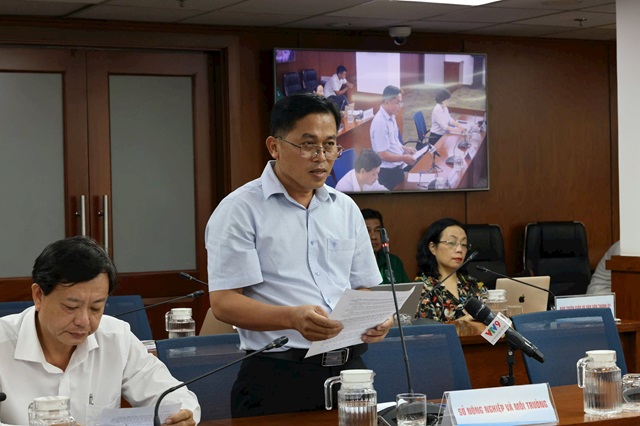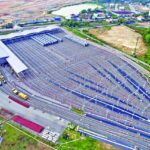This information was announced at a press conference held on May 8, providing an update on economic and social issues in Ho Chi Minh City.

Mr. Pham Tan Loc, Deputy Head of the Registration Department, Ho Chi Minh City Land Registry Office (Department of Agriculture and Environment) at the press conference.
|
Specifically, Mr. Pham Tan Loc, Deputy Head of the Registration Department, Ho Chi Minh City Land Registry Office (Department of Agriculture and Environment), stated that during the process of resolving procedures for granting permits to home buyers in real estate projects, the Department of Agriculture and Environment, along with specialized management departments of the city, identified 81,085 cases with unresolved obstacles in obtaining certificates for home buyers in commercial housing development projects.
According to the representative from the Department of Agriculture and Environment, through a thorough review, six main groups of obstacles were identified: cases awaiting tax payments, delayed submission of certificate issuance applications, new real estate projects, projects with additional financial obligations, projects with other complications, and projects under inspection or investigation.
As of now, the progress in addressing these obstacles has reached a rate of 78.7%, with 63,821 out of 81,085 cases resolved. The remaining cases with unresolved issues are primarily related to projects under investigation and inspection, as well as some projects undergoing adjustments in additional financial obligations due to changes in planning indicators.
Regarding the situation where many commercial housing projects have not been granted pink book certificates due to complications related to social housing obligations, Mr. Loc provided an explanation: For cases where land was allocated or the land use purpose was changed before the effective date of Decree No. 49/2021/ND-CP and Decree No. 100/2024/ND-CP of the Government, and the investor fulfilled their obligations to the State (by paying an amount equivalent to 20% of the land fund value for social housing construction), the land price was determined at the time when the competent state agency decided on land allocation, land lease, or land use purpose change.
For cases where land was allocated or the land use purpose was changed before the effective date, and the investor has not yet paid the amount equivalent to 20% of the land fund value for social housing construction, the land price determination time is when the investment in the technical infrastructure system is completed.
However, if implemented according to Clause 3, Article 2 of Decree No. 49/2021/ND-CP and Clause 4, Article 78 of Decree No. 100/2024/ND-CP, there would be a conflict with the provisions of Clause 3, Article 108 of the 2013 Land Law and Clause 3, Article 155 of the 2024 Land Law. This is because land laws through different periods stipulate that the time for determining land prices is when the state decides on land allocation, lease, or land use purpose change.
Consequently, a project would have two different land price determination dates (the date of the state’s decision on land allocation, lease, or land use purpose change as per Clause 3, Article 155 of the 2024 Land Law; and the date of project completion of technical infrastructure investment).
To resolve this issue, the Department of Agriculture and Environment is drafting a report to the City People’s Committee, who will then seek the opinion of the Prime Minister.
– 20:42 05/08/2025
The Race to 355km: Unlocking Metro Dreams in Ho Chi Minh City
Over the next decade, Ho Chi Minh City aims to revolutionize its transportation network by completing 355 kilometers of urban rail. This ambitious plan is poised to transform the city’s infrastructure, offering a long-awaited solution to chronic traffic congestion. The new rail network will not only provide a modern and integrated transport system but also serve as a catalyst for economic growth and urban development, strategically aligned with transit-oriented development (TOD) principles.
Should You Invest in Real Estate Amidst the Proposed Merger of Ho Chi Minh City, Binh Duong, and Ba Ria – Vung Tau?
The proposed merger of Ho Chi Minh City with Binh Duong and Ba Ria – Vung Tau provinces offers a unique opportunity to reshape the urban landscape and infrastructure of the region. This ambitious plan presents a blank canvas for innovative planning decisions and the potential to create thriving new communities. However, with great opportunity comes potential risk, especially for new investors entering the real estate market during this transformative phase.
Unveiling the Reasons Behind Northern Real Estate Investors’ Move Southward
“Savvy real estate investors with an eye for opportunity are turning their attention to the southern market, particularly the vibrant East region. Among the myriad of options, Izumi City stands out as a prime investment prospect. Strategically located and backed by a reputable developer, Izumi City offers a compelling proposition with its strong growth potential.”
The Great Detached Home – Villa Conundrum: An Unexpected Twist
“David Jackson, CEO of Avison Young, recently shared his insights on the future supply of villas and townhouses in Ho Chi Minh City. He emphasized that the majority of upcoming developments in these segments will be concentrated in the city’s satellite towns. This centrifugal direction is set to be the leading trend, shaping the real estate market.”
Affordable Housing Dominates with Over 3,300 Units Approved for Sale in April 2025.
According to data from local construction departments, there were 23 eligible projects with a total of 7,567 units of off-plan properties across 15 provinces and cities in April 2025. Social housing accounted for a significant portion of these, with 3,331 units.





















